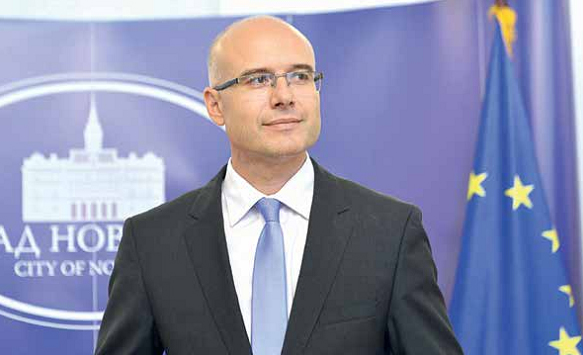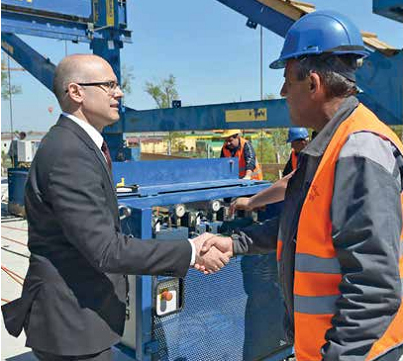The City has been working hard on attracting potential investors and promoting entrepreneurship, which should contribute to the creation of new jobs. Concurrently, projects are being implemented that should promote development of the economic and tourist potential, including Novi Sad’s candidacy for the European Capital of Culture in 2021.
The fact that the Serbian Progressive Party (SPP) occupies all four levels of government is a positive development that implies full agreement on the most important projects that will improve the lives of our citizens – says the incumbent and newly elected Mayor of Novi Sad, Miloš Vučević. You are starting your second term as mayor of Novi Sad. Which development direction should the City take and which economic branches are the best for its future?
— We have been developing industrial zones in the close proximity
of the E75 motorway, in addition to expanding the capacity of the Free Customs Zone and continuing to implement incentive programmes for the development of small enterprises, agriculture etc. We are creating an even better business climate and environment for future investors. Apart from industrial production, our construction sector has become the most appealing area to investors. The new data collated by the Ministry of Construction shows that construction activities are the highest in Novi Sad, i.e. higher than anywhere else in Serbia. Since 1st January, when we started issuing electronic building permits, the City’s Urban Planning Administration has received 1,330 building permit applications. Of all towns and cities in Serbia, Novi Sad has issued the most building
permits, which makes it the best environment for investors.
Some say that Novi Sad has fewer investments than other areas in Serbia because foreign investors have to pay €100 more for an average salary in the city than in smaller towns?
— The fact remains that the economy of Novi Sad is recovering. After several decades, production facilities are being opened by two multinational companies – Lear and Delphi – which are going to employ 5,000 people. The biggest international insurance companies
and banks, as well as one of the biggest global energy companies –
NIS Gazpromneft – operate in Novi Sad. We have been working hard on attracting potential investors, while our most important goal is to create new jobs. However, the most pressing matter at the moment is to harmonise our education system with the needs of the labour market. I think that dual education would be sustainable here and I have heard that many companies are willing to support it. Our education system needs to be reformed and, in order to have a more successful economy, we need to provide worker profiles that the labour market actually needs. As a local government, we have discussed the expansion of certain technical education majors so that pupils who graduate from these high schools would be able to find employment in existing and future factories in Novi Sad immediately after they finish school.
Very few people know that in the last ten years Novi Sad has been a hub of the IT industry, which currently employs over 5,000 people. How are the City authorities going to support this sector?
— The City authorities have been supporting the development of IT companies for years now, through the provision of assistance to startup programmes or first chance programmes, and by opening business incubators and cooperating with the local university. Novi Sad provides the biggest incentives in Serbia. This is where we are completely synchronised with the Serbian government’s policy of providing the best incentives in Europe, especially to start-ups, with the view of encouraging people to start their own businesses. I visited the Employment Fair recently and there I saw both large companies, like Lear and Delphi, and small family businesses, standing shoulder to shoulder. This is proof that we are on the right path and that our incentives programmes for self-employment, start-up programmes and first chance programmes are yielding results. With regard to the further development of the IT sector, and considering the fact that Novi Sad is the IT hub of Serbia, there is still the problem of a lack of highly-educated staff.According to certain data, Novi Sad needs at least 7,000 new IT professionals. Following the construction of the Science & Technology Park, I expect the Faculty of Technical Sciences to produce even more young IT experts. We need to provide a fast response to the market’s needs, especially when it comes to a sector that has been developing constantly.
The topic of revitalisation and reconstruction of Petrovaradin Fortress’s Suburbium has always been somehow pushed aside, while the 18th century Baroque quarter has been gradually deteriorating. Many medieval Central European towns have been earning millions of euros in tourist revenue from similar attractions. Why hasn’t the reconstruction of the Suburbium started yet?
— The problem lies in legal property relations. We have inherited an extremely difficult situation in Gradić (the Suburbium part of the Fortress) and I have been trying to resolve it at the systemic level, although time is working against us. The Suburbium is an important cultural and historic location with great tourist potential and we owe it to this city, which I love very much, to take care of it, because it lies at the foot of a fortress that has for centuries been a symbol of the defence and liberation of Novi Sad. The only thing I can confirm is that in the past four years we have been trying to find the quickest and best solution for the people living in the Suburbium, so that we can finally start revitalising the buildings and utility infrastructure there.
The Serbian Progressive Party (SNS) now occupies the leading positions at all four levels of government – the City of Novi Sad, the Province of Vojvodina, the Republic and the President of the Republic. What are the advantages and disadvantages of such a situation from your perspective?
— We are going to have cooperation and coordination without bureaucratic and political conflicts, as well as being in full agreement about the most important goals. The citizens chose us to be united around the projects that will create a better life in Serbia. And I do hope that we are never going to hear how the state government in Belgrade is to blame for everything, which many have used as an excuse for idleness or incompetence.
You were recently appointed as an SNS Vice President. What is the most important task that your party will have over the next year?
— We are not going to alienate ourselves from the people. You can be
sure of that. And if anyone forgets about the needs of their neighbours who voted for them, because they are intoxicated by the power of their high positions or privileges, the party will make sure that they take their cockiness somewhere else and not demonstrate it under the party’s umbrella. All officials are constantly being examined and none of them are untouchable or eternal. SNS is a people’s party, not an elitist party. It is the party of the future. We are not going to let political vanity destroy us, because the people voted for us to take care of them and not of our personal interests. We have been given yet another major opportunity to work for Serbia and we are not going to squander that.
What is your view of the situation at Radio & Television Vojvodina (RTV), with editors being replaced and subsequent protests?
— I am sorry that RTV has been a tenant for 16 years and this is the politicians’ fault, as well as the only instance when we are allowed to “meddle” in the work done by the provincial public broadcasting company, with the intention of helping them secure the best possible working environment and, above all, to get their own building after their headquarters in Mišeluk were destroyed in the 1999 air raids. As a local self-government, we are going to help with the construction of the new RTV building. I think that this is the most pressing issue for them at the moment. As far as the street protests go, my only concern is whether they have been properly registered with the police and if they are disturbing public order or not, and preventing the normal functioning of the city.
Vojvodina and Novi Sad are both multinational areas with a long tradition of tolerance between different nations and religions. There is a Serbian Orthodox church, a Catholic church, several Protestant churches, a synagogue and a Greek-Catholic Ruthenian church on a single square kilometre here. During Exit, we saw a peaceful Hindu procession of the Indian Chariot Festival. What future do multinational areas in Europe have, considering that many countries have edged closer to xenophobia and isolation in the last few years?
— I am proud of Serbia for showing that it is living the true European values. During the migrant crisis, we have shown solidarity and humanity towards all the people who were expelled from, or forced to leave, their homes. Not only that… It is our duty to make different nationalities feel good, not to foster division and not to fight, but rather to build a better Serbia together.
The EXIT Festival has become Novi Sad’s trademark event over the past 15 years. There are also many other events that bring in tourists. In which direction should the city’s tourist offer develop?
— The projects that we want to implement will greatly affect the city’s development, especially the development of its economic and tourist potential. I am referring to Novi Sad’s candidacy for the European Capital of Culture 2021. I cannot wait for October, when the decision will be made in Brussels. I will be very proud if Novi Sad wins the candidacy as the first city from a country that is an EU candidate. This will be great encouragement and an incentive, both for the City and the Republic of Serbia. I want us to be optimistic, to fight, to believe and, of course, to win. We are also candidates for the European Youth Capital 2019. We are also preparing to build Youth Polis – a centre for young and creative industries. The projects that are going to be implemented here are all geared towards young people who can have fun in the centre, while learning and exchanging knowledge and experience, which, in turn, creates new development
opportunities for Novi Sad.
Further from that, are you going to raise the issue of Čenej Airport again, which can be transformed into an airport for low-cost flights that could bring hundreds of thousands of tourists annually?
— I have had many meetings with people who love aviation and are willing to participate in a public-private partnership. We must first talk to the representatives of the Vojvodina Government, but I think we are on the right track to implementing this idea, which has been around for decades. The entire project requires a lot of money and there are certain property issues that need to be resolved. However, we don’t want to give up on our plan to modernise Čenej Airport in order for it to become suitable for commercial and cargo flights.

